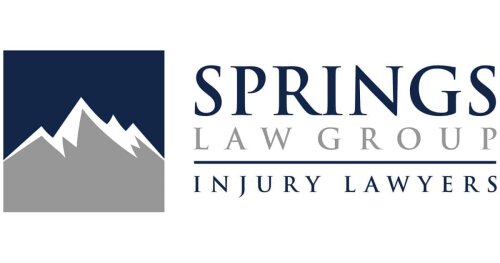Best Assault & Battery Lawyers in Colorado
Share your needs with us, get contacted by law firms.
Free. Takes 2 min.
Or refine your search by selecting a city:
List of the best lawyers in Colorado, United States

About Assault & Battery Law in Colorado, United States
Assault and battery are criminal offenses that involve causing harm or threatening harm to another person. In Colorado, the law defines these offenses through several degrees of assault, while the term "battery" is not separately recognized as it is in some other states. Instead, all unlawful physical force or attacks are classified under assault statutes. These laws can cover situations ranging from minor altercations to serious physical harm, and the consequences can include criminal charges, restraining orders, fines, and imprisonment. Understanding how Colorado law treats assault is vital for anyone involved in such a case, whether as a victim or an accused individual.
Why You May Need a Lawyer
Legal issues surrounding assault accusations or charges can be very serious and complex. You may need a lawyer if:
- You have been arrested or charged with assault in Colorado.
- You have received a summons or restraining order related to an altercation.
- You or your loved one is a victim of assault seeking justice or protection.
- You need guidance about your rights and potential defenses.
- You face allegations in civil lawsuits related to assault injuries.
- You have been accused in an incident involving self-defense claims or mutual combat.
- You want to appeal a conviction or change the terms of your sentencing.
Colorado’s assault laws can lead to jail, fines, and a permanent criminal record. Having a lawyer experienced with local courts and statutes can help protect your rights and navigate complex legal processes.
Local Laws Overview
Assault in Colorado is categorized by degrees, each with specific legal definitions and corresponding penalties:
- First Degree Assault (C.R.S. 18-3-202): Involves intentionally causing serious bodily injury using a deadly weapon or with extreme indifference to human life. This is a Class 3 felony with severe penalties.
- Second Degree Assault (C.R.S. 18-3-203): Involves causing injury with intent but under circumstances considered less severe than first degree. This still includes use of weapons or causing injury to law enforcement officers. It is a Class 4 felony.
- Third Degree Assault (C.R.S. 18-3-204): Involves knowingly or recklessly causing bodily injury without serious harm or a deadly weapon. This is a Class 1 misdemeanor, but sometimes treated as an extraordinary risk crime with possible jail time.
- Menacing (C.R.S. 18-3-206): Threatening or attempting to place another person in fear of imminent serious bodily injury, sometimes classified as assault depending on the facts.
- Self-Defense and Defenses: Colorado law recognizes self-defense, defense of others, and defense of property as possible legal defenses, but their application depends on facts and evidence.
- Domestic Violence: If the alleged assault involves intimate partners or family members, laws related to domestic violence may also be involved, potentially increasing the severity of consequences.
Understanding the specific charge and its elements is important for building a defense or pursing justice.
Frequently Asked Questions
What is the difference between assault and battery in Colorado?
Colorado law does not have a separate charge for battery. All acts that might be considered battery in other states, such as unwanted physical contact, are prosecuted under assault statutes.
What are the penalties for an assault conviction in Colorado?
Penalties range from fines and probation for misdemeanors to lengthy prison sentences for felony assault. The degree of harm, use of weapons, and whether the victim is a protected person like a police officer can increase penalties.
Can I go to jail for third degree assault?
Yes. Third degree assault, a Class 1 misdemeanor, can lead to up to 18 months in jail and fines. It is considered an extraordinary risk crime, so courts treat it seriously.
Is self-defense a valid defense to assault charges?
Yes, but self-defense must be reasonable and proportional to the threat. The law will consider whether the use of force was necessary to protect oneself or someone else from imminent harm.
What should I do if I am accused of assault?
Do not discuss the incident with police or others without a lawyer present. Exercise your right to remain silent, seek legal representation, and follow your lawyer’s guidance.
What if the assault accusation is false?
Victims of false accusations should gather any evidence, including witness statements or security footage, and contact a defense attorney immediately. False accusations can still lead to arrest and prosecution.
Is physical contact always required for assault charges?
Not always. Some assault charges can be based on threats or attempts to cause harm, even if no physical contact occurs, particularly under menacing statutes.
What impact does alcohol or drug use have on assault charges?
Being under the influence is not a defense to assault, though it may affect the circumstances or available defenses. In some cases, intoxication can lead to reduced control or exacerbate charges.
Can assault charges be dropped or reduced?
Yes, under certain circumstances, charges may be dismissed or reduced through plea bargaining, pretrial diversion, or if evidence is insufficient. An attorney can negotiate with prosecutors on your behalf.
Does an assault conviction go on my permanent record?
Yes. Convictions appear on criminal records and may affect employment, housing, and other areas. Some cases may be eligible for sealing, but this depends on the charge and outcome.
Additional Resources
- Colorado Judicial Branch: Offers information on criminal cases, court procedures, and self-help resources.
- Colorado Office of Victim Assistance: Provides support services and legal help for victims of violent crimes.
- Colorado Department of Public Safety - Division of Criminal Justice: Information about crime prevention and support services.
- Colorado Legal Services: Offers free or low-cost legal assistance to eligible residents.
- Local Police Departments: For immediate help or filing reports related to assault.
- Local Bar Associations: Can refer you to qualified criminal defense attorneys in your area.
Next Steps
If you are facing assault allegations in Colorado, or if you are a victim seeking justice, here is what you should do next:
- Seek Immediate Help: If in physical danger, contact law enforcement or emergency services right away.
- Do Not Make Statements: Do not discuss the case or your involvement with anyone except your lawyer.
- Contact a Qualified Attorney: Look for criminal defense or victim advocacy attorneys with experience in Colorado assault cases for a case evaluation.
- Gather Evidence: Save any relevant documents, photographs, communications, or witness contacts that may help your case.
- Follow Legal Advice: Once you have legal representation, follow their guidance on attending court dates, complying with orders, or negotiating settlements.
Addressing assault charges or claims with professional legal support can help you make informed decisions and protect your rights under Colorado law.
Lawzana helps you find the best lawyers and law firms in Colorado through a curated and pre-screened list of qualified legal professionals. Our platform offers rankings and detailed profiles of attorneys and law firms, allowing you to compare based on practice areas, including Assault & Battery, experience, and client feedback.
Each profile includes a description of the firm's areas of practice, client reviews, team members and partners, year of establishment, spoken languages, office locations, contact information, social media presence, and any published articles or resources. Most firms on our platform speak English and are experienced in both local and international legal matters.
Get a quote from top-rated law firms in Colorado, United States — quickly, securely, and without unnecessary hassle.
Disclaimer:
The information provided on this page is for general informational purposes only and does not constitute legal advice. While we strive to ensure the accuracy and relevance of the content, legal information may change over time, and interpretations of the law can vary. You should always consult with a qualified legal professional for advice specific to your situation.
We disclaim all liability for actions taken or not taken based on the content of this page. If you believe any information is incorrect or outdated, please contact us, and we will review and update it where appropriate.
Browse assault & battery law firms by city in Colorado
Refine your search by selecting a city.










